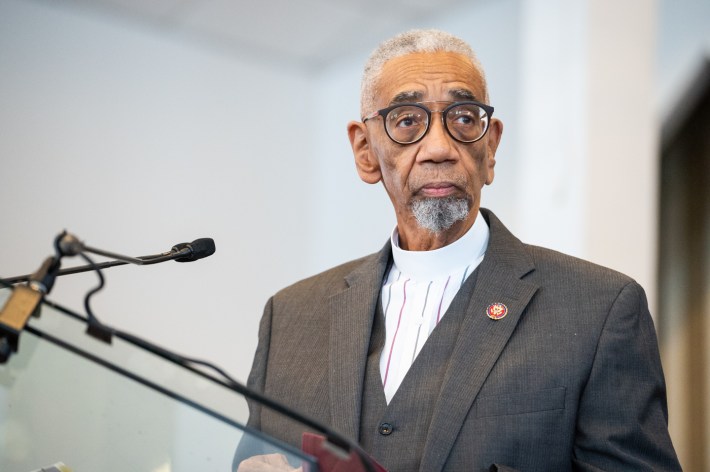Jonathan Jackson Declares Victory In 1st District Primary To Replace Bobby Rush In Congress
[ad_1]
GRAND BOULEVARD — Jonathan Jackson declared victory against 16 competitors for the Democratic nomination for Illinois’ 1st Congressional District seat, making him Rep. Bobby Rush’s likely successor in representing the deep-blue South Side district.
With 93 percent of precincts reporting, Jackson, an activist and businessman, received 27.8 percent of the vote, according to unofficial returns. He’s the son of civil rights icon the Rev. Jesse Jackson and brother of disgraced former U.S. Rep. Jesse Jackson Jr.
Pat Dowell, Chicago’s 3rd Ward alderman, garnered 19 percent of the vote. Dowell announced her congressional campaign one day after Rush revealed he’d step down, shifting her focus from running for Secretary of State.
Karin Norington-Reaves, former CEO of the Chicago Cook Workforce Partnership and Rush’s pick to replace him, was in third with 14.2 percent of the vote. Trailing her was State Sen. Jacqueline Collins with 12.1 percent, pastor Chris Butler with 5.7 percent and My Block, My Hood, My City founder Jahmal Cole with 4.9 percent, according to unofficial totals.
Jonathan Swain, owner of the Kimbark Beverage Shoppe in Hyde Park and founder of the Hyde Park Summer Fest, raised the most in the race as of June 8 with $543,199. He was followed by Dowell with $531,812, Norington-Reaves with $459,827 and Jackson with $375,304.
Cryptocurrency groups spent more than $1 million on campaign advertisements to boost Jackson’s campaign in the final days of the race, according to the Sun-Times.
The other candidates for the 1st District seat were:
The 17 candidates in the primary race held few major differences on hot-button national issues like cutting health care costs, reducing fossil fuel dependence and curtailing gun violence.
They largely touted their political experience — or lack thereof, in the cases of candidates who pushed back against establishment politics — to differentiate themselves ahead of Tuesday’s election.
 Credit: Colin Boyle/Block Club Chicago
Credit: Colin Boyle/Block Club ChicagoArmy veteran Eric Carlson, gun store owner Jeff Regnier, former 7th Ward committeeperson Philanise White and Geno Young squared off in Tuesday’s Republican primary for the 1st District seat. Carlson was found guilty in 1995 of criminal sexual assault and served nearly six years in prison, the Tribune reported last week.
In 1929, Oscar Stanton De Priest became the first Black person elected to Congress in the 20th century. The district has been represented by Black men ever since — including Harold Washington, who resigned in 1983 after he was elected Chicago’s first Black mayor.
A Republican has not held the 1st District seat since De Priest lost his reelection bid in 1934.
Replacing Rush
Rush, 75, announced Jan. 4 he would step down when his 15th term in the House of Representatives ends next year. Norington-Reaves announced her candidacy Jan. 9 and received Rush’s endorsement days later.
Rush was re-elected to the 1st District seat 14 consecutive times with few serious challenges. His only election loss in the last 30 years came in 1999, when he ran for mayor against incumbent Richard M. Daley.
Then-Sen. Barack Obama’s only election loss came when the future president ran for Rush’s seat in 2000.
Rush has highlighted his efforts in Congress around infrastructure, gun violence prevention and social justice as he prepares to step down.
Among the achievements Rush has touted:
- His advocacy for justice in the case of Joseph Gould, a Black man experiencing homelessness who was killed by white, off-duty Chicago police officer Gregory Becker in 1995.
- The 2008 passage of the Toy Bill, which banned lead in toys and boosted funding for the Consumer Product Safety Commission.
- Legislation to study postpartum depression and support people experiencing it. The legislation was named after Melanie Blocker Stokes, a Lake Meadows Apartments resident who died by suicide in 2001 weeks after giving birth. The bill passed into law without funding in 2010 as part of the Affordable Care Act.
- Rush’s 2012 protest after George Zimmerman killed Black teenager Trayvon Martin. Rush wore a hoodie on the House floor in honor of Martin before being escorted out of the session for violating a rule barring hats.
Rush vowed in January to pass anti-lynching legislation before leaving office. That vow was fulfilled in March when President Joe Biden signed the Emmett Till Anti-Lynching Act into law, making lynching a federal hate crime for the first time.
As congressperson, Rush has “repeatedly failed to pay federal, state or local taxes on time,” according to the Better Government Association. Along with his second wife, Carolyn, he was sued over home mortgages and unpaid property taxes in 2010.
Rush was also found liable for more than $1 million in loans given toward Beloved Community Church’s failed church expansion, and a judge ordered his congressional paychecks garnished in an effort to pay back the loans.
Rush missed more votes than any other representative between 2007 and 2015, a period during which he and Carolyn experienced severe health problems.
The House ethics committee found in 2018 he broke the law by accepting rent-free office space as a gift for more than two decades.
Rush will remain a public figure and fight “for equity and justice” in his community as pastor of the Beloved Community Church of God in Christ, he said in January. The church got its start as a Bible study group after Rush was ordained as a minister in 2002, according to the Tribune.
Listen to “It’s All Good: A Block Club Chicago Podcast”:
Listen to “It’s All Good: A Block Club Chicago Podcast”:
Listen to “It’s All Good: A Block Club Chicago Podcast”:
[ad_2]
Source link